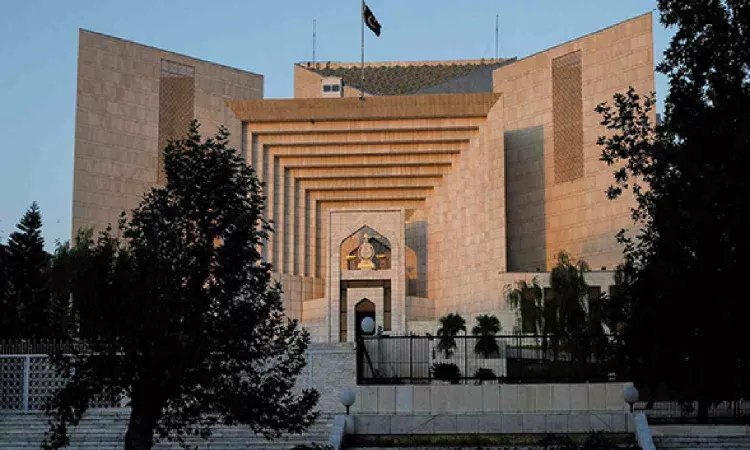Pakistan SC suspends Peshawar High Court verdict on reserved seats
This comes as a three-judge bench, led by Justice Mansoor Ali Shah, granted leave to appeal and adjourned the matter till June 3.

View of the Supreme Court of Pakistan building in Islamabad (Reuters)
ISLAMABAD: The Supreme Court of Pakistan on Monday suspended the Peshawar High Court (PHC) and the Election Commission of Pakistan's (ECP) order allocating reserved seats to other parties, The Express Tribune reported.
This comes as a three-judge bench, led by Justice Mansoor Ali Shah, granted leave to appeal and adjourned the matter till June 3.
The bench unanimously suspended the ECP's decision for the re-allocation of reserved seats to other political parties.
The PHC through its earlier verdict dashed the Pakistan Tehreek-e-Insaf's hopes of getting reserved seats as it dismissed the Sunni Ittehad Council's (SIC) petition challenging the ECP's ruling that denied reserved seats to the party.
PTI-backed independent candidates had found a new home in the SIC after the party lost its election symbol as a result of the ruling in the intra-party election case.
This is the first time the PTI has managed to secure relief from the apex court during the tenure of CJP Qazi Faez Isa, The Express Tribune reported.
During the hearing earlier today. Justice Shah summoned the attorney general for Pakistan (AGP) and an ECP representative as the court took up a petition filed by the SIC, The Express Tribune reported.
As the hearing commenced, Justice Shah observed that the basic principle of democracy and the Constitution is the people's mandate, which should be reflected in the parliament.
"A majority can't be negated on technical grounds," the court added.
The bench also inquired whether the Constitution or the election act stipulated that reserved seats would be reallocated to other parties such as the PML-N, PPPP, etc.
"If a political party is unable to attain an election symbol, its voters would be disenfranchised," observed Justice Athar Minallah.
Additional Attorney General Chaudhry Amir Rehman argued that the matter required "constitutional interpretation" and alleged that a larger bench be formed for adjudication.
However, he was informed that the hearing is at the "leave granting stage".
The bench further noted that after the initial hearing, the matter regarding the requirement of a larger bench will be considered.
The SIC, comprising PTI-backed lawmakers, challenged on April 1 the PHC's March 14 order that deprived the party of reserved seats, The Express Tribune reported.
The petition stated that the PTI candidates joined the SIC after their party lost its electoral symbol, adding that the ECP also raised no objections to the above independent returned candidates joining the SIC.
The party contended that the fundamental premise of the proportional representation system for allocating reserved seats for women and non-Muslims, as outlined in Article 51(6)(d)(e) and Article 106(3)(c) of the Constitution, 1973, does not hinge on whether a political party submits candidate lists for reserved seats before the general election or whether the party contested the election, The Express Tribune reported.
Instead, the party asserted that the core constitutional basis for the right to reserved seats under the proportional representation system is determined by the "total number of general seats secured by each political party from the province concerned in the National Assembly" or the "total number of general seats secured by each political party in the provincial assembly.
On March 4, the ECP accepted applications of the opposing parties and decided that the seats in the National Assembly and provincial assemblies would not remain vacant and would be allocated by a proportional representation process of political parties based on seats won by political parties.



